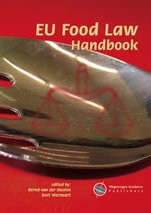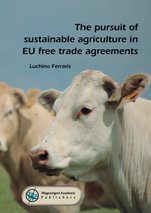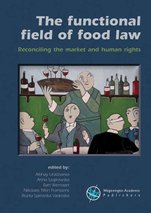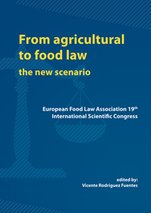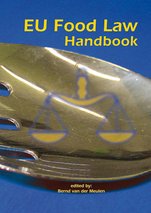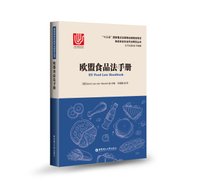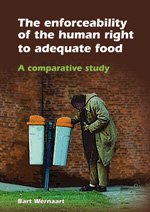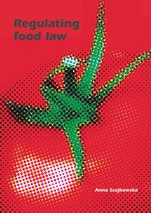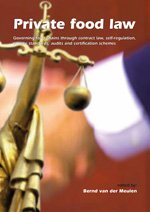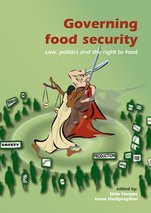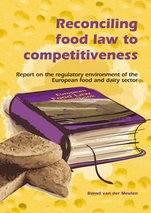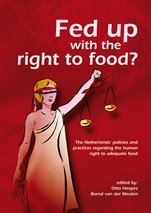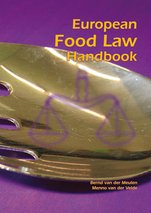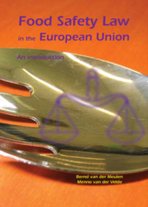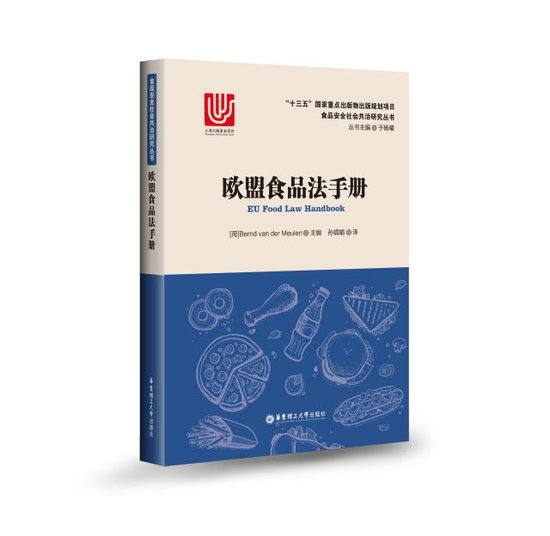European Institute for Food Law.
We make you confident.
European Institute for Food Law Series of Books.
In cooperation with Wageningen Academic Publishers, the European Institute for Food Law Publishes the European Institute for Food Law Series of books on food law in its widest sense (Series ISSN: 1871-3483).
True to the function of legal scholarship in general to serve and advance legal practice, the European Institute for Food Law Series presents scholarship that describes, analyses and explains food law in ways that advance academic understanding, are suitable for education and support practical application.
Edited by Bernd van der Meulen and Bart Wernaart.
The twenty-first century has witnessed a fundamental reform of food law in the European Union, to the point where modern EU food law has now come of age. This 'EU Food Law Handbook' presents the most significant elements of these legal develop ments with contributions from a highly qualified international team of academics and practitioners. Their analysis
is based on a shared vision of the structure and content of EU food law. The book takes the perspective of food law embedded within general EU law. It highlights the consequences of this combination and provides insights into both substantive and procedural food law.
Taking the General Food Law as a focal point, this handbook systematically analyses and explains the institutional, substantive and procedural elements of EU food law. Principles are discussed as well as specific rules addressing food as a product, the processes related to food and communication about food to consumers through labelling. These rules define requirements on subjects like market authorisation for food additives, novel foods and genetically modified foods, chemical and biological contaminants in food, food hygiene, tracking & tracing, withdrawal & recall, food labelling and claims. The powers of public authorities to enforce food law and to deal with incidents are outlined. Attention is given to the international context (WTO, Codex Alimentarius) as well as to private standards.
In addition to the systematic analysis, the book includes selected topics such as nutrition and health policy, special foods, food import requirements, food contact materials, intellectual property, private food law, and animal feed.
In this new edition, existing chapters have been updated to take account of many important developments in legislation and case law. Several new topics have been added to the analysis such as the right to food, organics and food fraud.
PhD Thesis by Luchino Ferraris
This book explores the extent to which EU Free Trade Agreements (FTAs) pursue sustainable agriculture in third country parties. It contends that this should be part of a duty for the EU enshrined in the Treaties to promote its fundamental values in its external action. It suggests that the extent to which this occurs in practice, may be reviewed judicially by the Court of Justice of the European Union. Against this
background, selected agreements concluded by the EU with developed and developing countries (Canada, South Korea, Ukraine, Chile, SADC countries and Vietnam) are taken as case studies.
The author concludes that, in spite of the remarkable progress made hitherto, EU trade policy is still far from being in line with the increasingly strong commitment of the EU to take the lead in the international arena for environmental and climate matters.
This work adopts primarily a legal methodology, but it broaches the subject in interdisciplinary terms. It is addressed not only to (EU) policy-makers, but also to scholars of different fields and to the wider public interested in topics that have become of common concern for the future of our planet.
With a foreword by Daniel Calleja Crespo, Director General of the European Commission - DG Environment.
Volume 11 The functional field of food law. Reconciling the market and human rights
Edited by Altinay Urazbaeva, Anna Szajkowska, Bart Wernaart, Nikolaas Tilkin Franssens and Rozita Spirovska Vaskoska
Two worlds that in academia remain largely separated are brought together in this book in a unique way; the world of food safety law and the world of the right to food. Key features include: (1) an up to date reflection of the status quo on food law related research written
by those who are at the forefront of research in the functional field of food law; (2) a collection of contributions from all continents of the world; and (3) covering human rights, international law, European law and non-European law dimensions.
This book is written as a Liber Amicorum in honour of Professor Bernd van der Meulen, who was the Chair of Law and Governance at Wageningen University (2001-2018), and established food law as an academic discipline in the Netherlands. In 29 contributions the functional field of food law is discussed. The contributors are researchers and academics from around the globe, and are above all friends who have worked with Bernd during his time at Wageningen University. In this book, they share their latest insights, research and thoughts on this fascinating and highly relevant field.
Proceedings of the ELFA (European Food Law Association) scientific conference, edited by Vicente Rodríguez Fuentes. Published in cooperation with EFLA.
The differences between agricultural law and food law are becoming progressively blurred. This is only natural because both intend to ensure that food products placed on the market are safe and respond to a certain standard of quality. In their present form,
both are relatively new legal disciplines, evolving and expanding rapidly. A great number of new and transcendental regulations (and an increasing number of compulsory private rules) are being enacted to respond to new realities.
One of these new realities is the legal protection of quality in food. Once almost exclusively applied to a limited number of traditional well-known products and now extended to many products covered by designations of origin or geographical indications. Another area is food safety, a major concern of the legislator. Food alerts, recalls and withdrawals have been carefully regulated to guarantee a rapid and efficient reaction, but these legal mechanisms appear to be less well-designed when dealing with the unwanted consequences of unjustified alerts. A third topic is food prices and trading conditions, an area that cannot always be completely left to unregulated market-forces due to the special nature of the product involved.
The above issues are analysed by several experts from different legal backgrounds and countries, a varied approach adequate to the hybrid nature of food law.
Edited by Bernd van der Meulen
The twenty-first century has witnessed a fundamental reform of food law in the European Union, to the point where modern EU food law has now come of age. This 'EU Food Law Handbook' presents the most significant elements of these legal developments with contributions from a highly qualified team of academics and practitioners. Their analysis is based on a shared vision on the structure and content of EU
food law. The book takes the perspective of food law embedded within general EU law. It highlights the consequences of this combination and provides insights into both substantive and procedural food law.
Taking the General Food Law as a focal point, this handbook analyses and explains the institutional, substantive and procedural elements of EU food law. Principles are discussed as well as specific rules addressing food as a product, the processes related to food and communication about food to consumers through labelling. These rules define requirements on subjects like market authorisation for food additives, novel foods and genetically modified foods, food hygiene, tracking & tracing, withdrawal & recall. The powers of public authorities to enforce food law and to deal with incidents are outlined. Attention is given to the international context (WTO, Codex Alimentarius) as well as to private standards.
In addition to the systematic analysis, the book includes selected topics such as nutrition and health policy, special foods, food import requirements, food contact materials, intellectual property and animal feed.
The 'EU Food Law Handbook' is relevant for practitioners and academics both with and without a background in law. It is ideal for education purposes.
Edited by Sun Juanjuan and Bernd van der Meulen
planning project was set up aiming at a “Food Safety Social Co-Governance Research Series.”
The EU Food Law Handbook is now available in Chinese language! According to those who read the language, Dr. Sun Juanjuan did an excellent job in translating and editing. The book is published by East China University of Science and Technology Press.
The book is one of a series. Under the 13th Five-Year Plan a national key publications
The books to be included in this series were selected through the Shanghai education and education integration project “National Major Service Publishing Project for Colleges and Universities.” The editor-in-chief is Professor Yang Yan of East China University of Science and Technology.
According to Xu Jinghe (Director of the Legal Department, of the former State Food and Drug Administration) “This book, translated by Dr. Sun Juanjuan, holds the crystallization of wisdom acquired over years of EU food safety reform, exploration and practice. It provides us with a wealth of experience in grasping the laws of food safety governance, advancing food safety governance strategies and improving food safety governance standards in the new era. It combines practical experience and a broad international perspective.”
Prof. Hu Jinguang (chairman of the board of the Collaborative Innovation Center for Food Safety Governance, at the Law School of Renmin University of China) states: “In specific areas such as food safety, the state attaches great importance to the use of legal thinking and the rule of law in governance. Correspondingly, from the basic legislation of food safety to secondary legislation covering different aspects of products, processes, and information, the EU offers advanced legal technologies, detailed and extraterritorial experience.”
PhD thesis by Bart F.W. Wernaart.
While the right to adequate food is often discussed in the context of developing countries, especially in situations where access to adequate food is a problem on a larger scale, this book focusses on the right to food in two Western countries in which theoretically the economic circumstances allow this right to be enjoyed by each individual. Through a legal comparative study, the enforceability of the right to
food is compared between the Netherlands and Belgium in light of the current UN Human Rights system.
There seems to be a difference between what the countries do, what they say they do, and what they should do on the matter. As it appears, the coincidental constitutional circumstances mainly determine the enforceability of the right to food, rather than the content of the human right in itself.
This book includes a thorough analysis of suitable comparative legal methodology and the embedment of the right to food in the UN human right system. Furthermore, for both countries, an in-depth analysis of the case law on the right to food (mostly concerning the status of foreigners), the constitutional context in which the Judiciary operates, and the relevant UN reports and subsequent procedures are outlined. Finally, recommendations are made to both countries and the relevant UN Committees.
Volume 7 Regulating food law. Risk analysis and the precautionary principle as general principles of EU food law
PhD thesis by Anna Szajkowska
Animal cloning, nanotechnology, and genetic modifications are all examples of recent controversies around food regulation where scientific evidence occupies a central position. This book provides a fresh perspective on EU scientific food safety governance by offering a legal insight into risk analysis and the precautionary principle, positioned as general principles of EU food law.
To explain what the science-based requirement means in EU multi-level governance, this book places these principles in the legislative dynamics of the EU internal market and the meta-framework of the international trade regime established by the WTO. Numerous examples of the case-law of European Courts show implications of risk analysis and science-based food law for EU and national decision makers, as well as food businesses.
This book focuses on the crucial aspects of the risk analysis methodology. It redefines the precautionary principle and clarifies its scope of application. It analyses the extent to which non-scientific factors, such as consumers' risk perception, local traditions or ethical considerations, can be taken into account at national and EU level. This book argues that, compared to EU institutions, the autonomy allocated to national authorities is much more limited, which raises questions about the legitimacy of food safety governance in the EU.
Volume 6 Private food law. Governing food chains through contract law, self-regulation, private standards, audits and certification schemes
Edited by Bernd van der Meulen. Published in cooperation with EFLA.
Since the turn of the Millennium, world-wide initiatives from the private sector have turned the regulatory environment for food businesses upside down. For the first time in legal literature this book analyses private law initiatives relating to the food chain, often referred to as private (voluntary) standards or schemes.
Private standards are used to remedy flaws in legislation, in order to reach higher levels of consumer protection than the ones chosen by the EU legislature and to manage risks and liability beyond the traditional limits of food businesses. We see that litigation is no longer solely framed by legislative requirements, but ever more by private standards such as GlobalGAP, BRC, IFS, SQF, FSSC22000 and ISO. These private standards incorporate public law requirements thus embedding them in contractual relations and exporting them beyond the jurisdiction of public legislators. Other standards focus on corporate social responsibility or sustainability. This book also addresses how private religious standards such as Kosher and Halal play a role in defining specific markets of growing importance. It is noted that organic standards have found an interesting symbioses with public law.
Another development on this topic is that food businesses are inspected more often by private auditors than by public inspectors. Effects in terms of receiving or being denied certification far outweigh public law sanctions. In short private law has changed an entire legal infrastructure for the food sector. It emerges as competing with the public law regulatory infrastructure.
This book is of interest to all who concern themselves with food law legislation and litigation and the evolving role of private standards on changing the landscape of food chains and innovation.
It is available as free eBook.
Volume 5 Governing food security. Law, politics and the right to food
Edited by Otto Hospes and Irene Hadiprayitno
Festschrift commemorating 25 years of Law and Governance Group at Wageningen University
With only five years left until the 2015 deadline to achieve the Millennium Development Goals, food security still is a dream rather than reality: ‘a situation that exists when all people, at all times, have physical and economic access to sufficient, safe and nutritious food to meet their dietary needs and food preferences
for an active and healthy life’.
Political commitments at world summits on food security, market-based agricultural policies, science-based food safety regulation and voluntary guidelines on the right to food have not ended hunger, malnourishment or food safety crises in our world. The question arises whether food insecurity is a situation that exists in spite of these commitments and legal measures, or rather due to them?
This book has three purposes. Firstly, it offers insights in how law, politics and the right to food contribute to food security in both positive and negative ways. For this purpose, different theories, concepts and methodologies from legal, political, anthropological and sociological sciences are used and developed. Secondly, the book explains that food security and food policies cannot be treated as given, at one level or in one domain only. This is done in different ways: by pointing out the emergence of new paradigms on food security, human rights and science that shape food policies; by showing how law and policies at one level affect food security at another level; and by treating food security and food policies as linked to governance regimes of agriculture, food, feed, water or property. Finally, the book offers scholarly analysis of paradigms and practices but also presents social science-based ways to indirectly contribute to food security, varying from improving justiciability to building trust, from seeking ways to address non-scientific concerns to creating room for plurality of lifestyles and norms, from unmasking dominant discourse to understanding or strengthening abilities or arrangements to cope with vulnerability.
Volume 4 Reconciling food law to competitiveness. Report on the regulatory environment of the European food and dairy sector
Edited by Bernd van der Meulen
The food sector is in the top three most regulated industries in the EU. It is the most important production sector, but its competitiveness and innovativeness are under pressure.
This book reports on a legal research into the question if there is a connection between the sector's declining innovativeness and competitiveness on the one hand and the increasing regulatory burden on the other
hand. The aim is to indicate opportunities to remove avoidable obstacles for the food industry in general and small and medium enterprises in particular.
The book brings to light several shortcomings in the regulatory framework and makes concrete recommendations for simplifying and improving EU food legislation. The findings are based on fundamental legal analyses. They are combined with the following three empirical case studies:
- premarket approval schemes, for novel foods in particular;
- the application of the EU food hygiene package in the dairy sector in selected regions in Italy and France; and
- private standards in the Dutch dairy sector.
The book shows that compliance by the EU legislator and authorities with EU food law principles and requirements is key to improving the position of food businesses.
Volume 3 Fed up with the right to food? The Netherlands’ policies and practices regarding the human right to adequate food
Edited by Otto Hospes and Bernd van der Meulen
There is no one in this world who would deny the importance of access to adequate food for every human being. In fact, access to food has been declared a human right in 1948 with the Universal Declaration of Human Rights. In spite of the right to food to be more than half a century old, many are not aware, misunderstand or even marginalize this human right. This book serves two purposes and many
audiences.
First, it is meant for those who want to get a better understanding of the right to food and how this right has been developed in international law. Second, it also explains why this human right has been marginalized by one of the richest countries in the world: the Netherlands. As such this unique collection of articles provides an exciting view on the making of law and policy, with contributions from lawyers, sociologists and human rights defenders.
Volume 2 European Food Law Handbook (sold out)
Bernd van der Meulen and Menno van der Velde
Succeeded by the EU Food Law Handbook (vol. 9).
Volume 1 Food Safety Law in the European Union (sold out)
Bernd van der Meulen and Menno van der Velde
Introduction to EU food law. Succeeded first by the European Food Law Handbook (vol. 2), then by the EU Food Law Handbook (vol. 9).










